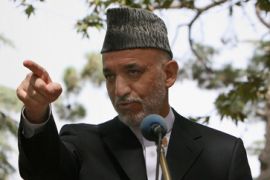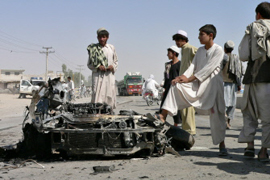Profile: Hamid Karzai
The Afghan president is facing a resurgent Taliban and worsening security situation.

 |
| During his seven years in power, Karzai has called for increased funds from donor countries [EPA] |
Since the fall of the Taliban in 2001, many western governments came to regard Hamid Karzai as the face of a new, democratic Afghanistan.
Strongly supported by the administration of George Bush, the former US president, Karzai was expected to implement political and economic reform policies by 2005. However, he has proved to be more cautious than was expected.
Though he announced that he would put an end to poppy cultivation, little has been done to eliminate the drug trade’s influence on the local economy. According to the UN, Afghanistan today supplies nearly 90 per cent of the world’s heroin.
Poppy cultivation has remained a lucrative economic option for many farmers, particularly in remote rural areas where poverty is rampant.
By 2007, International donors had spent more than $12bn in aid and reconstruction funds but Karzai’s critics say much of the monies have been misappropriated due to government corruption.
Karzai has in previous years said that western donations were insufficient and called for renewed efforts to revitalise the Afghan economy.
Hope for stability in Afghanistan began to fade in 2006 when a resurgent Taliban began to seize control of large swathes of the mountainous regions, leaving Karzai in control of Kabul, the capital.
Western governments became frustrated that development in Afghanistan appeared to have stalled and that al-Qaeda had found a new safe haven in Pakistan.
In an interview with Al Jazeera in February, Karzai admitted his relationship with Washington had been strained in recent months because of US counter-insurgency tactics.
He said: “There is a tension between us and the US government on issues of civilian casualties, arrests of Afghans, nightly raids on homes and the casualties that they cause.”
Early career
 |
| Karzai has fostered better relations with regional powers like India and China [AFP] |
Born in Karz near Kandahar in southern Afghanistan on December 24, 1957 to a distinguished Pashtun family of the Popolzai tribe, Karzai grew up in a politically-oriented family – his father was a member of parliament and supporter of the monarchy.
In the late 1970s, Karzai left Afghanistan to pursue a Masters degree in international relations and political science at the University of Simla in India.
In 1983, he moved to Pakistan where he took an active role in the Mujahideen resistance against the Soviet invasion of Afghanistan.
In 1989, he became the director of the foreign relations unit in the interim government of the Mujahideen transitional government.
Karzai was appointed deputy foreign minister in the government of Burhanuddin Rabbani, the then Afghan president and leader of the United Islamic Front, from 1992 to 1994.
He subsequently resigned his position saying he had become disillusioned by the fighting among the various factions.
Taliban
He then allied himself with the newly-formed Taliban, but his support for the Islamist group was short-lived and he distanced himself from their politics when he saw non-Afghans setting up training camps throughout the country.
In 1997, he returned to Pakistan and organised an armed resistance movement against the Taliban.
In 1999, the Taliban assassinated his father.
After the 9/11 attacks, Karzai returned to Afghanistan and spearheaded efforts to form an interim ruling body to replace the Taliban.
On December 5, 2001, Karzai was elected chairman of the interim administration of Afghanistan, at the UN-sponsored Bonn Conference, which was established to find ways to rebuild the war-ravaged country into a viable state.
In June 2002, the loya jirga – a gathering of all the tribal leaders and elders of Afghanistan – elected Karzai to serve as president.
Analysts and press credited Karzai’s charm, his mild manner, intelligent persuasiveness, and sartorial stylishness for this success.
President
In September 2004, he won 21 of the 34 provinces in Afghanistan’s first post-war national elections, defeating his 22 opponents to become the country’s first democratically-elected leader.
However, Karzai has still been unable to establish peace and security and revitalise the economy. There still are constant outbreaks of violence among various ethnic groups and the Taliban and al-Qaeda have regrouped in Northwestern Pakistan, which they use as a base to launch almost daily attacks against Afghan and Nato forces.
Today, the writ of the Afghan government works only in a few urban areas. Vast mountainous rural territories are controlled by local chieftains and warlords allied with the Taliban and other militant outfits.
The Taliban have appeared increasingly emboldened.
In early February 2009, a group of Taliban suicide bombers and armed men attacked government offices near the presidential palace and the US embassy in Kabul, killing 20 people and wounding several others.
Criticism
 |
| Afghan onlookers stand over the site of a suicide car bomb attack in Kandahar [AFP] |
As security continued to deteriorate and civilian casualties increased, Karzai’s popularity has waned.
The president’s critics say little has been done to ensure the economic betterment of the common person.
In his first visit to Kabul, Richard Holbrooke, the US envoy to Pakistan and Afghanistan, insisted on holding talks with senior Afghan security officials before meeting Karzai.
The US special representative, who arrived in Kabul on Thursday, has previously criticised Karzai’s government as “weak”, “corrupt” and suffering from “thin leadership”.
“Quite clearly they don’t seem to be a fan of president Karzai, they don’t seem to approve of what he is doing in terms of trying to crack down on the drugs trade, in trying to crack down on the Taliban,” Al Jazeera’s Hamish Macdonald reported from Kabul.
Deteriorating ties
Analysts have said that current US policy appears to be by-passing Karzai and working more closely with regional or provincial administrations.
On February 28, 2009, Karzai called on the country’s electoral commission to bring forward elections originally scheduled for August 2009.
Opponents of the president have said the move “may just be an effort by Karzai to use his advantage as president to wrong-foot them and use his office to help his campaign [for re-election].
Karzai’s move comes amid deterioration in relations between Washington and Kabul, ostensibly over how to tackle opposition fighters linked to the Taliban, al-Qaeda and tribal leaders.
Al Jazeera’s James Bays, reporting from Kabul, said that after seven years of Karzai’s rule, some in the international community see him “as part of the problem rather than part of the solution”.